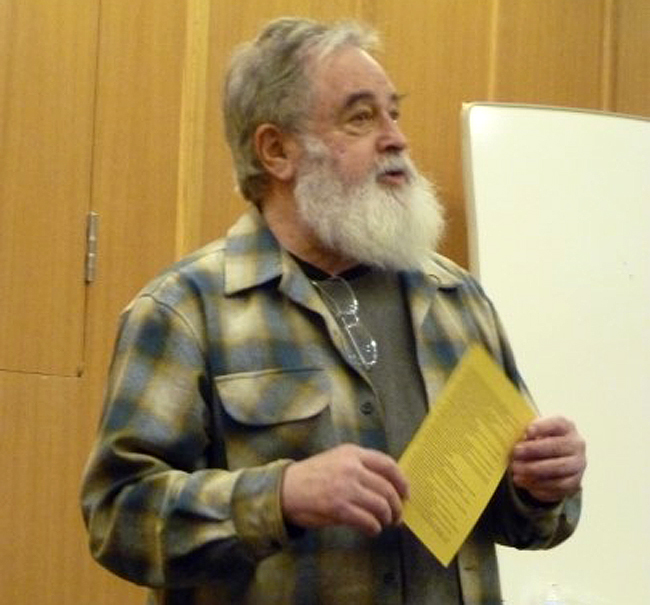Red Pine on Heart Sutra for Seattle Ecosangha
Written by: Bill Hirsch

Red Pine speaking about the essence of the Heart Sutra, at Seattle University.
A large group gathered in Seattle Feb. 19, to hear Red Pine expound on the Heart Sutra.
Red Pine, a noted Buddhist author and translator of Chinese works, was born as Bill Porter. His talk filled Seattle University’s Wyckoff Auditorium, in an event organized by the Seattle University EcoSangha.
The Heart Sutra is a classic and brief Mahayana Buddhist explanation of emptiness, supposedly given in the presence of the Buddha, on Vulture Peak Mountain in Rajagriha, India.
The title of Red Pine’s talk was “The Heart Sutra: Womb of the Buddhas,” and his emphasis was on the sutra as a refutation of the Abidharmist’s “knowledge” system, which is based on a catalogued and schematic classification of the Buddha’s teaching.
“Once you ‘know,’” Red Pine said, “you fall victim to delusion.”
The Abhidharma refers to a collection of texts, assembled several centuries after the time of the Buddha, which contain precise, technical explanations of core Buddhist doctrines.
According to Red Pine, the Heart Sutra is a critique of how we think, and at the same time an attempt to take us back to our “pre-knowledge minds” to, as Zen thinkers like to say, “our original face, before we were born.”
Red Pine pointed out that Prajna-Paramita was also the name of a “goddess” – the mother of all Buddhas. Thus, he said, the Heart Sutra enables rebirth in the womb of Prajna-Paramita.
Red Pine said the mantra associated with the sutra – “Gate, Gate, Paragate, Parasamgate, Bodhi, Svaha” — is a “thought-protector” that allows us to replace the conceptual “knowledge” of the Abidharma, with the non-conceptual, non-delusional reality of Prajna-Paramita.
The complete talk can be heard online.
